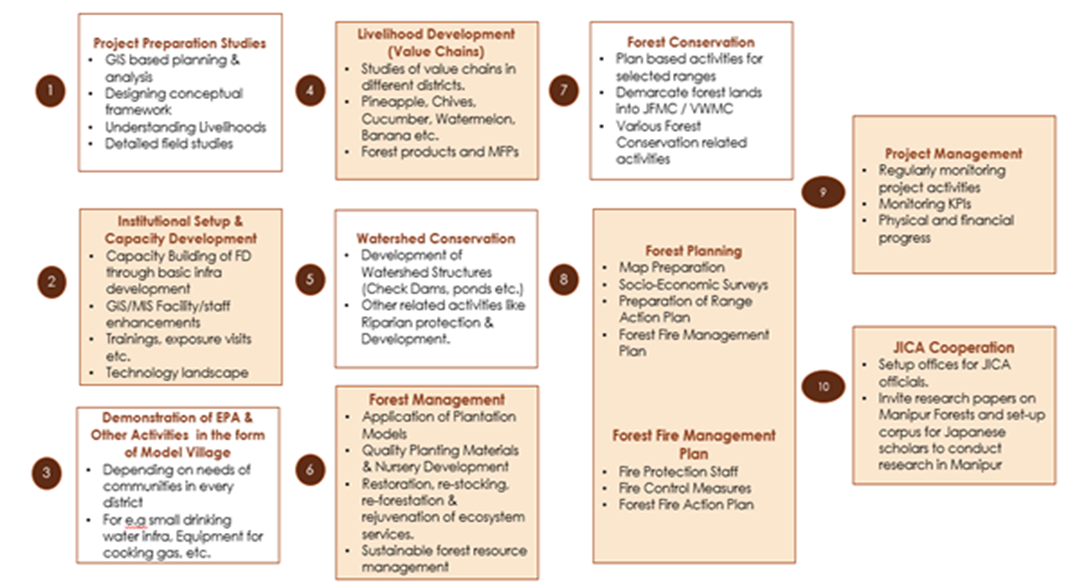Manipur, known for its rich biodiversity and forests, has witnessed significant forest degradation and environmental challenges in recent years. Between 2017 and 2021, the state lost 4.5% of its forest cover, contributing to severe soil erosion, water scarcity, and depletion of forest resources vital for local livelihoods. Slash-and-burn agriculture and unsustainable land-use practices exacerbated the situation, impacting the environment and the economy. Against this backdrop, Primus Partners was engaged to design and implement a comprehensive watershed management project to build climate resilience and enhance community livelihoods.
The project aimed to address the dual challenge of environmental degradation and poverty by creating a conservation framework that promoted sustainable resource management while improving the socio-economic conditions of local communities.
Our Approach
Primus Partners took a multi-faceted approach to tackling the challenges of deforestation, water scarcity, and community vulnerability in Manipur:

- Thorough Data Collection: The project began with an extensive data-driven analysis of forest degradation, environmental factors, and community needs. Manipur’s per capita income is 37% lower than the national average, and unsustainable agricultural techniques left large areas unproductive. The data helped prioritize regions and interventions that would deliver the greatest impact.
- Comprehensive Plan: The solution involved a holistic plan focused on forest regeneration, water conservation, livelihood enhancement, and infrastructure development. The project encompassed a combination of artificial and natural regeneration techniques, agroforestry, and capacity-building initiatives. Special focus was given to creating community-level interventions, including check dams, gabion structures, and recharge ponds for sustainable watershed management.
- Community Engagement and Capacity Building: Extensive consultations with the local population were undertaken to ensure that the interventions were culturally appropriate and sustainable. Capacity-building programs helped train locals in sustainable forest management and agroforestry practices, fostering a sense of ownership and long-term commitment.
- Livelihood Development: The project also focused on enhancing livelihoods by improving value chains for local products and developing eco-tourism initiatives. This included IT infrastructure, skill development, and direct interventions like Self-Help Group (SHG) creation.
The watershed development project in Manipur demonstrates how environmental conservation can be successfully integrated with community livelihood enhancement. Through data-driven planning, extensive stakeholder engagement, and infrastructure development, Primus Partners has helped Manipur address the twin challenges of forest degradation and poverty. The long-term impact will be a more resilient ecosystem, empowered communities, and sustainable growth in one of India’s most ecologically sensitive regions.
The Benefits
The project has delivered several measurable benefits for the region:
Forest and Water Resource Management: Direct interventions in forest management covered over 18,000 hectares, while indirect interventions benefited 44,000 hectares. Watershed conservation efforts improved soil quality, controlled erosion, and improved water retention in vulnerable areas, addressing water scarcity issues.
Infrastructure Development: Check dams, recharge ponds, river training works, and other water management infrastructure were built, benefiting agriculture and forest regeneration efforts. Conservation initiatives for non-critical catchments also contributed to long-term environmental sustainability.
Economic Empowerment: At least five local product' value chains were improved, creating economic opportunities for the community. Eco-tourism and IT infrastructure initiatives empowered locals with new livelihood avenues. Capacity-building initiatives led to the creation of 100 SHGs, improving economic resilience among local populations.
Community Involvement: The engagement of local communities in sustainable forestry practices and agroforestry helped reduce dependency on harmful practices like jhum cultivation, ensuring long-term environmental and economic benefits.


